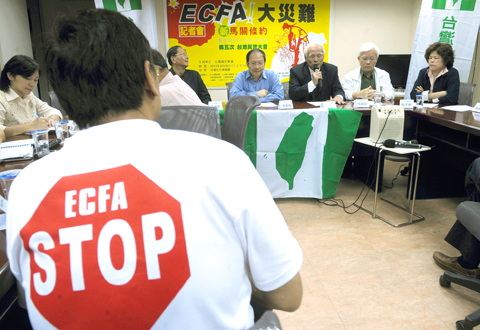President Ma Ying-jeou (馬英九) should stop negotiating the economic cooperation framework agreement (ECFA) with China and seek public consensus on the controversial issue, a cross-strait expert said yesterday.
Former Mainland Affairs Council (MAC) deputy chairman Tung Chen-yuan (童振源) said that the differences between the ruling and opposition parties on the issue were not significant.
“But what we see right now is that the president is taking a politically confrontational position against the opposition leader,” Tung said.

PHOTO: WANG MIN-WEI, TAIPEI TIMES
If the administration insists on forging ahead with the ECFA and signs it next month or in June, Tung said, tension is bound to increase and the administration is unlikely to get what it wants at the negotiating table.
At the very least Beijing gave no undertaking not to block Taiwan’s bid to ink free trade agreements (FTA) with other countries during the second round of negotiations on ECFA three weeks ago, he said.
While it takes time to gather and integrate the opinions of the service sector and to draft detailed plans, Tung said it was worrying that the administration had apparently failed to make any effort in this regard.
If the ruling and opposition parties cannot come to a consensus on the matter, Tung said, then a referendum would be the best and least expensive way to resolve the controversy.
Tung made the remarks during a talk at National Chengchi University yesterday afternoon.
Tung, a professor at the university’s Graduate Institute of Development Studies, said that instead of signing a framework agreement with China, Taiwan should sign separate trade deals to address different problems faced by each business sector.
He also criticized the administration for promoting the “early harvest” program as if it were a bonus to signing the ECFA, when many of the industries on the list have been manipulated by special interest groups.
While it is imperative that the government conduct a comprehensive assessment of the overall impact the proposed accord would have on the economy and work to forge a broad-based consensus, Tung said he did not see the administration making such an effort.
In an effort to normalize economic relations and cooperation across the Taiwan Strait, Tung urged the Ma administration to continue negotiations on trade issues with China through the Straits Exchange Foundation (SEF) and China’s Association for Relations Across the Taiwan Strait (ARATS).
If the negotiations on the ECFA must continue, Tung said the administration should consider signing trade pacts with China and the US at the same time. He also suggested the Presidential Office establish a committee chaired by Ma to formulate strategy to promote Taiwan’s global economic integration. Such a committee would solicit opinions from opposition parties, experts and academics, as well as representatives from industry and labor, he said.
Tung also proposed that the government prioritize signing a preferential trade agreement with Beijing under the General Agreement on Tariffs and Trade.

An essay competition jointly organized by a local writing society and a publisher affiliated with the Chinese Communist Party (CCP) might have contravened the Act Governing Relations Between the People of the Taiwan Area and the Mainland Area (臺灣地區與大陸地區人民關係條例), the Mainland Affairs Council (MAC) said on Thursday. “In this case, the partner organization is clearly an agency under the CCP’s Fujian Provincial Committee,” MAC Deputy Minister and spokesperson Liang Wen-chieh (梁文傑) said at a news briefing in Taipei. “It also involves bringing Taiwanese students to China with all-expenses-paid arrangements to attend award ceremonies and camps,” Liang said. Those two “characteristics” are typically sufficient

A magnitude 5.9 earthquake that struck about 33km off the coast of Hualien City was the "main shock" in a series of quakes in the area, with aftershocks expected over the next three days, the Central Weather Administration (CWA) said yesterday. Prior to the magnitude 5.9 quake shaking most of Taiwan at 6:53pm yesterday, six other earthquakes stronger than a magnitude of 4, starting with a magnitude 5.5 quake at 6:09pm, occurred in the area. CWA Seismological Center Director Wu Chien-fu (吳健富) confirmed that the quakes were all part of the same series and that the magnitude 5.5 temblor was

The brilliant blue waters, thick foliage and bucolic atmosphere on this seemingly idyllic archipelago deep in the Pacific Ocean belie the key role it now plays in a titanic geopolitical struggle. Palau is again on the front line as China, and the US and its allies prepare their forces in an intensifying contest for control over the Asia-Pacific region. The democratic nation of just 17,000 people hosts US-controlled airstrips and soon-to-be-completed radar installations that the US military describes as “critical” to monitoring vast swathes of water and airspace. It is also a key piece of the second island chain, a string of

The Central Weather Administration has issued a heat alert for southeastern Taiwan, warning of temperatures as high as 36°C today, while alerting some coastal areas of strong winds later in the day. Kaohsiung’s Neimen District (內門) and Pingtung County’s Neipu Township (內埔) are under an orange heat alert, which warns of temperatures as high as 36°C for three consecutive days, the CWA said, citing southwest winds. The heat would also extend to Tainan’s Nansi (楠西) and Yujing (玉井) districts, as well as Pingtung’s Gaoshu (高樹), Yanpu (鹽埔) and Majia (瑪家) townships, it said, forecasting highs of up to 36°C in those areas